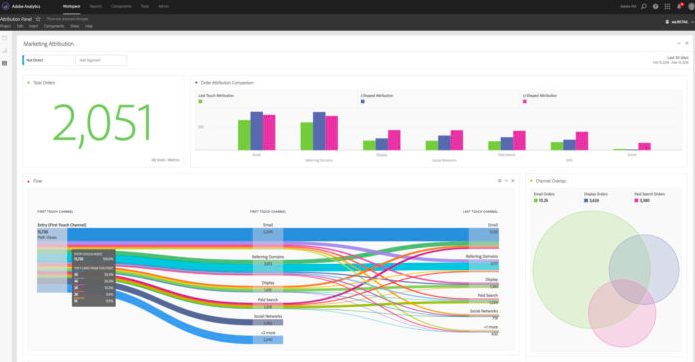
Adobe has announced a suite of updates to its cloud marketing stack, including attribution improvements and the ability to hyper-personalise ads for marketers in the travel sector.
The software company launched Attribution IQ at Cannes Lions earlier this week, an update to its Analytics Cloud that will offer marketers a 10 different models for measuring the effect of their marketing campaigns.
In a blog post, Adobe Analytics’ senior product manager, Trevor Paulsen, said the product would “allow brands to break from the reliance on first-touch and last-touch attribution” to help marketers better understand how today’s customers are influenced.
“[Attribution IQ] is the only solution in-market that allows you to dive deeper into the specific campaigns, products, or internal promotions, giving fair credit to the impact of channels like social and mobile while showing how this differs amongst different individuals, products, or creative campaigns,” said Paulsen.
“Instead of seeing the first and last scene of a movie, brands can now access the full film,” he added.

The update comes when many retailers are seeing a decline in foot traffic and an insurgence of digital competitors, providing the justification needed to up and secure budgets for creative online campaigns.
Adobe says users of the product could see that paid and organic social are driving customers of particular segments – such as female Gen Z millennials – to revisit and complete cart purchases, for example, where this behaviour would have been “invisible” before.
“Instead of simply comparing display versus social ads, for instance, users can now see how individual campaigns and even specific keywords performed using a rich set of attribution models,” said Paulsen.
The programme will be available within Adobe Analytics’ Analysis Workspace tool, providing a visualised customer journey and all points where the consumer interacted with a brand.
Tracking travelers
Adobe’s Experience Cloud claims use from nine out of 10 of the world’s largest hotel chains and seven out of 10 of the largest airlines, and some powerful new features are now available to track travelers across touchpoints and use the amassed data for powerful personalised advertising.
How a consumer interacts with an airline’s app can be challenging to track effectively, explains Nate Smith, also a product manager at Adobe Analytics.
“[…] a traveler may check-in the day prior to the flight on their laptop, open the app to gain access to the boarding pass once in the security line and may check the weather at their destination while onboard, using the in-flight wifi.”
However, the expanded integration between Adobe Analytics and Audience Manager could help an airline understand this as one customer journey, allowing marketers to better analyse consumers’ needs at each step and drive customer experiences “quickly and at scale”.
This would improve brands’ capacity to personalise ads based on data such as purchase history, loyalty programme status and online actions.
“A hotel chain can identify customers who have already purchased a room in the past month, and curtail advertising towards that group, ultimately driving greater ad efficiency,” Smith adds.
A final update, meanwhile, comes to Adobe Advertising Cloud. Seeking to ride on the rise of smart speakers, such as Amazon Alexa, Bose SoundTouch and Sonos, advertisers are now able to target 90-second audio ads on Tune-In, a service with more than 75 million listeners and over 120,000 radio stations.
These can be targeted by device type, station type or multicultural segment.
 Interested in hearing leading global brands discuss subjects like this in person?
Interested in hearing leading global brands discuss subjects like this in person?
Find out more about Digital Marketing World Forum (#DMWF) Europe, London, North America, and Singapore.





